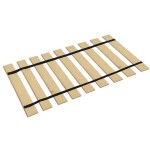Is a King or Queen Bed Bigger? A Comprehensive Guide to Bed Sizes
Choosing the right bed size is a crucial decision for a comfortable sleep experience. Understanding the dimensions of different bed sizes helps consumers make informed choices based on their individual needs and bedroom space. This guide clarifies the size difference between king and queen beds and explores other standard bed sizes available in the market.
King vs. Queen: Deciphering the Dimensions
A king-size bed is larger than a queen-size bed. A standard king measures 76 inches wide and 80 inches long, while a standard queen measures 60 inches wide and 80 inches long. This means a king bed offers 16 inches of additional width compared to a queen. This added space makes a king bed ideal for couples who prefer more personal sleeping space or for individuals who enjoy spreading out.
Standard Bed Sizes: A Comparative Overview
Understanding the range of standard bed sizes available helps consumers visualize their options and select the best fit. Here’s a breakdown of common bed dimensions:
- Twin: 38 inches wide x 75 inches long
- Twin XL: 38 inches wide x 80 inches long
- Full/Double: 54 inches wide x 75 inches long
- Queen: 60 inches wide x 80 inches long
- King: 76 inches wide x 80 inches long
- California King: 72 inches wide x 84 inches long
California King vs. Standard King: Length over Width
While a standard king bed is wider, a California king bed is longer. Measuring 72 inches wide and 84 inches long, the California king provides an additional 4 inches of length compared to a standard king or queen. This makes it a suitable choice for taller individuals.
Choosing the Right Size: Factors to Consider
Several factors influence the decision of which bed size is most appropriate. Considering these factors helps narrow down the choices and select the optimal bed size.
Bedroom Space: Ensuring Adequate Room
The available bedroom space is a primary consideration. A king-size bed requires significantly more floor space than a queen. Measuring the bedroom and visualizing the bed placement helps ensure sufficient room for movement and other furniture.
Sleeping Habits: Personal Space and Comfort
Individual sleeping habits play a crucial role in determining the right bed size. Couples who prefer ample personal space might find a king bed more comfortable, while those who sleep close together might find a queen sufficient.
Budget: Considering the Cost Implications
Bed sizes directly impact cost. King-size beds, mattresses, and bedding are generally more expensive than queen-size options. Considering the budget helps manage expenses effectively.
Number of Sleepers: Accommodating Needs
The number of people who will regularly sleep in the bed is a key factor. A king bed is typically more suitable for two adults, while a queen might suffice for a single adult or a couple who prefers close proximity.
Children or Pets: Sharing the Bed
If children or pets frequently share the bed, a larger size might be necessary. A king bed offers more space to accommodate additional sleepers without compromising comfort.
Mattress Height: Accessibility and Aesthetics
Mattress height, combined with bed frame height, affects the overall height of the bed. Considering the ease of getting in and out of bed is important, especially for individuals with mobility concerns. The overall height also contributes to the aesthetic appearance of the bedroom.
Bedding and Accessories: Finding the Right Fit
Finding appropriately sized bedding, such as sheets, blankets, and comforters, is crucial for a comfortable and visually appealing bed. Ensure that the chosen bedding is specifically designed for the selected bed size.
Room Layout and Furniture Placement: Creating a Harmonious Space
Consider the overall room layout and furniture placement when choosing a bed size. A large bed in a small room might overwhelm the space, while a smaller bed in a large room might appear disproportionate. Visualizing the bed within the room’s context helps create a balanced and harmonious space.
Long-Term Considerations: Anticipating Future Needs
Anticipating future needs, such as potential changes in living arrangements or family size, is essential for a long-term perspective. Choosing a bed size that accommodates potential future needs can save the expense and hassle of replacing the bed later on.
.jpg?strip=all)
King Vs Queen Size Beds Differences Comparison And Benefits

Queen Vs King Bed Size Comparison What Is Better Sleep Advisor

Blog King Vs Queen Bed A Comparison Guide Big Fig Mattress

The Difference Between A Queen And King Bed Bedinabox

King Vs Queen Bed Size Mattress What Is The Difference Nectar Sleep

King Vs Queen Bed What S The Difference Amerisleep

The Ultimate Mattress Size Chart And Bed Dimensions Guide Sleep Advisor

King Vs Queen Size Mattress Dreamcloud

King Vs Queen Bed Comparison Which Size Should You Choose

Mattress Guide King Vs Queen Bed Sleepworld
Related Posts







